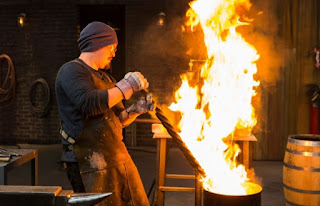here is a set of illustrations that I have been thinking
about for a while:
I love this show on the history channel- forged in fire. I
have seen every episode. it has everything that I love in a show: competition,
action, and making things.
the show begins with 4 blacksmiths- they are given 3 hours
to forge a blade. sometimes they choose they metal that they use, sometimes its
assigned to them. sometimes they make a blade in their signature style,
sometimes they are told what kind of blade to make. sometimes they are given
special parameters to meet in their blade. they are then told how the blade
will be tested. it will be tested for strength, sharpness and durability. the
blade may be tested by chopping ice, or stabbing into metal; how it is used will
determine what kind of blade the blacksmiths will forge.
form follows function.
after that, the bladesmiths are given a 10 minute window to
make a shop drawing of their blade. they will determine the length, the type of
handle and the edge geometry. after that, they will go to work forging their
blades- but as they do, they will continue to compare what they are making to
their shop drawing. if their blade is too short, they will draw out the metal
until it matches the drawing. if it is too short, they will cut their blade
until it matches the shop drawing. failure to meet parameters of cause for
immediate removal from the competition.
we are forged in fire. we are like those blades. there is a
shop drawing that we must conform to- and that is to the image of Christ. God
heats us, and bends us, and cuts us, and hammers us until we are a perfect
match.
the bible says that, "we are God’s handiwork, created
in Christ Jesus to do good works, which God prepared in advance for us to do.”
God is the blacksmith, and we are the iron in His hands. He has a special
purpose for us to fulfill; and He has shaped us according to the job that He
has reserved for us. a chopping blade is designed one way, a slicing one
another, and a stabbing blade has another design. the design tells the user
what it should be used for. form follows function. the same is true for us:
some of us are artists, some are counselors, some are revolutionaries; and each
of us has been made according to the function He has created us for.
chopping blades should not be jealous of slicing blades.
they are not made to slice- they are made to chop. piercing blades should not
be jealous of cooking knives. they were not made for that- they were made to
pierce. each of us has been hand-made for a special purpose that God has
assigned to us- and we do that role better than anyone else.
God is the blacksmith and we are the steel. He has a shop
drawing for us- a plan for what we will become. Jeremiah 29:11 says: “For I
know the plans I have for you,” declares the Lord, “plans to prosper you and
not to harm you, plans to give you hope and a future.” He is making something
out of us: something useful, strong and sharp. The process of making a blade is
uncomfortable for the steel, but in the end, it is stronger and more useful
than ever. The process that God uses to make us is often uncomfortable, but He
is creating something strong, useful and sharp. It is uncomfortable, but we can
trust Him as He works.
God is love.
-rev-rob
-rev-rob








